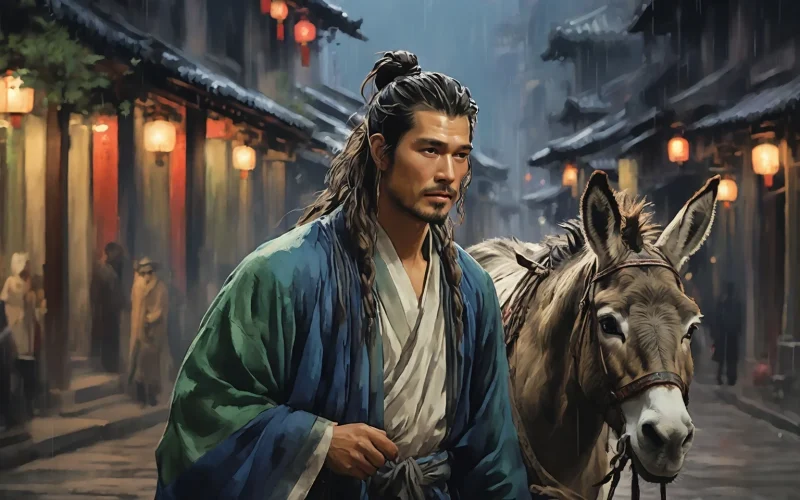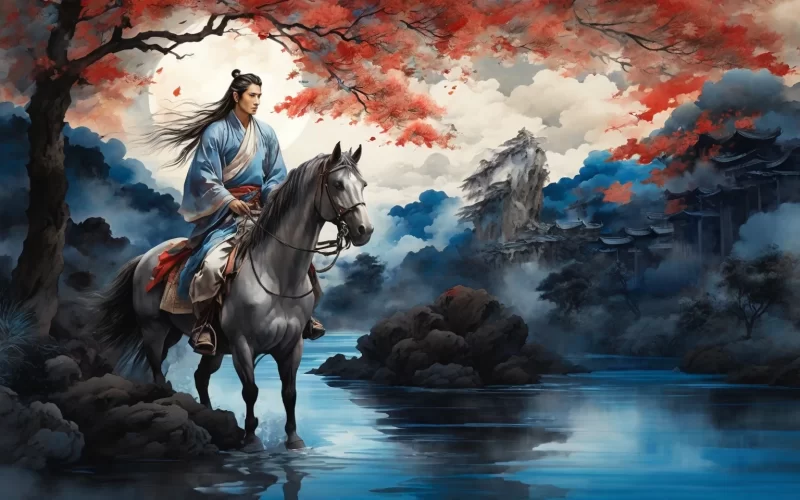From hundred-foot-high city wall I look afar;
Beyond green willow trees the sandy islets are.
I remember a scholar while young shed vain tears,
And a famed scholar roamed in the spring of his years.
I can't forget white-haired General on the lake floating,
After changing the face of the world he went boating.
An owl might feed on dead rats with good appetite,
But a phoenix would perch on trees of lofty height.
Original Poem:
「安定城楼」
李商隐
迢递高城百尺楼,绿杨枝外尽汀洲。
贾生年少虚垂泪,王粲春来更远游。
永忆江湖归白发,欲回天地入扁舟。
不知腐鼠成滋味,猜意鹓雏竟未休。
Interpretation:
In 838 CE, after passing the imperial examination, Li Shangyin participated in the Ministry of Rites’ erudite literary examination but was disqualified due to political factionalism. Disheartened, he returned to Jingyuan. During the spring, he ascended the Anding Tower in Jingyuan, gazing at the surrounding scenery and expressing his frustrations with his unfulfilled aspirations, disdain for sycophants, and steadfast commitment to his ideals. This poem reflects the young Li Shangyin’s grand ambitions and his ability to remain unfettered by immediate setbacks.
First Couplet: “迢递高城百尺楼,绿杨枝外尽汀洲。”
(On the lofty, winding city walls stands a hundred-foot tower; beyond the green willow branches, the open sandbars stretch.)
The opening lines depict the expansive view from the tower. The imagery of the high tower and distant sandbars creates a sense of vastness and underscores the poet's open-mindedness. The word "迢递" highlights the tower’s height and remoteness, setting a tone of lofty aspirations.
Second Couplet: “贾生年少虚垂泪,王粲春来更远游。”
(Jia Yi wept in vain in his youth despite his talents; Wang Can wandered far from home during the spring.)
By referencing the stories of Jia Yi and Wang Can, Li Shangyin draws a parallel between their misfortunes and his own. Jia Yi lamented his underappreciated talents, and Wang Can roamed far from his homeland. These allusions emphasize the poet’s frustration at being unable to realize his potential while evoking a sense of shared struggle among the talented but unrecognized.
Third Couplet: “永忆江湖归白发,欲回天地入扁舟。”
(I will one day, with white hair, return to the rivers and lakes, but for now, I yearn to transform the world and embark on great ventures.)
Here, the poet juxtaposes his yearning for a tranquil life with his ambition to achieve greatness. Though the desire for seclusion may seem at odds with his aspirations, the two ideals complement each other, reflecting a balanced and dynamic outlook on life.
Fourth Couplet: “不知腐鼠成滋味,猜意鹓雏竟未休。”
(It is baffling that some relish decayed rats, while suspicion of the noble fledgling continues unabated.)
Alluding to Zhuangzi's fable, the poet criticizes those who pursue trivial gains and deride genuine talent. The imagery of the "corrupt rat" and "noble fledgling" reveals the poet's disdain for mediocrity and his unwavering self-assurance in his integrity and values.
Writing Features:
- Integration of Scenery and Emotion: The poem seamlessly blends the scenery from the tower with the poet’s emotions, creating a rich, evocative atmosphere.
- Skillful Use of Allusions: References to Jia Yi, Wang Can, and Zhuangzi add depth, allowing the poet to convey his aspirations and struggles through historical and literary parallels.
- Contrast and Satire: The juxtaposition of virtuous talent and corrupt mediocrity highlights the poet’s disdain for sycophants and his pride in his moral integrity.
- Concise and Profound Language: The poem’s brevity is paired with rich meaning, reflecting complex emotions and ideas with polished precision.
Overall Appreciation:
This poem expresses the poet’s aspirations and frustrations through the act of ascending a tower and contemplating the view. The first two couplets use imagery and historical allusions to articulate his feelings of disappointment and resolve. The final couplets elevate the poem, showcasing his lofty ambitions, disdain for mediocrity, and unyielding ideals. The poem progresses emotionally, moving from melancholy to determination and ultimately conveying a sense of noble perseverance. It is a testament to Li Shangyin’s youthful ambition and elevated character.
Insights:
This poem inspires us to reflect on perseverance in the face of adversity and the importance of maintaining integrity and ambition. Li Shangyin’s response to setbacks teaches us that even in challenging times, one must remain steadfast in pursuing one’s ideals and rise above trivialities. His words encourage us to find strength in adversity and embrace life’s challenges with dignity and purpose.
Poem translator:
Xu Yuan-chong (许渊冲)
About the poet

Li Shangyin (李商隐), 813 - 858 AD, was a great poet of the late Tang Dynasty. His poems were on a par with those of Du Mu, and he was known as "Little Li Du". Li Shangyin was a native of Qinyang, Jiaozuo City, Henan Province. When he was a teenager, he lost his father at the age of nine, and was called "Zheshui East and West, half a century of wandering".











